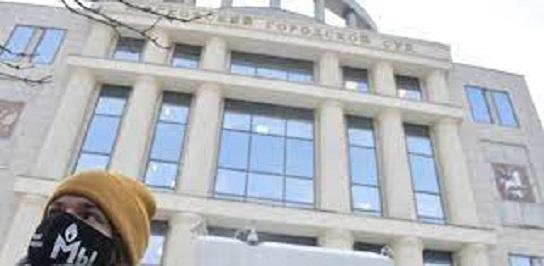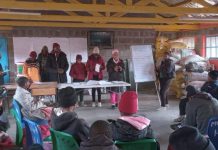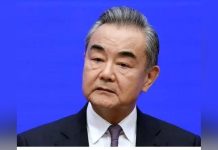Africa-Press – Lesotho. In a bid to speed up the establishment of Human Rights Commission (HRC), the United Nations (UN) in collaboration with the Ministry of Law and Justice held a one day advocacy workshop to explore options for fast tracking its establishment.
The meeting brought together sixty participants from the Ministry of Law and Justice, Members of Parliament (MPs), Civil Society Organizations (CSO), academics and private legal practitioners.
Speaking at the workshop, the Minister of Justice and Law Advocate Lekhetho Rakuoane mentioned that the establishment of the HRC was one of the priorities of the government as demonstrated in the proposed amendments to the Constitution.
“In many legal jurisdictions it is believed that human rights are best protected through Acts of Parliament and Courts of Law by way of legal remedies and judgments.
Some people have questioned the necessity of establishing special national machinery devoted to the promotion and protection of human rights, given that the legislature and judiciary are adequate in this regard.
On the other hand, the Government of Lesotho shares the view that the purpose and role of National Human Rights Institutions (NHRIs) in the enforcement and protection of human rights is complementary to the work of the judiciary.
While the judicial system requires stringent rules, NHRIs tend to provide speedy procedures for resolving human rights complaints. As a result, access to justice, promotion and protection of human rights are easily realized,” Rakuoane informed.
He added that Lesotho received recommendations from various treaty monitoring bodies; International Covenant on Civil and Political Rights (ICCPR), Convention on the Rights of the Child (CRC), Convention on the Elimination of all forms of Discrimination against Women (CEDAW) and the African Charter on Human and Peoples Rights.
He added that the Universal Periodic Review (UPR) has requested Lesotho to establish a NHRIs and to ensure that it is fully independent, an element that the government will implement to the best of its ability.
“Lesotho has thus heeded to this call from the international community to establish and operationalize the National Human Rights Commission,” Rakuoane noted.
The UN Resident Coordinator Amanda Khozi Mukwashi appreciated the Government of Lesotho for the steps already taken towards the establishment of the HRC as an institution that will enhance the promotion and protection of human rights.
“Basotho have been calling for the establishment of a HRC. That is what they said during the national dialogue and that is what they continue to call for. I call on Parliamentarians present to support the enactment of the legislation without further delay,” Mukwashi pleaded.
During discussions, MPs who have been deliberating on several Bills including establishment of the Commission mentioned that there was no choice but to wait for the constitutional amendment. This is because passing the HRC Bill as it is without amending the constitution would be in contravention with the constitution as it stands now.
There were different legal opinions expressed in the workshop some arguing that there was no need for constitutional amendment since there are a number of human rights institutions in Africa and the rest of the world that were not enshrined in their countries’ constitutions but are fully functional and strong.
“Legal advisors from government who were present in the workshop advised that the HRC Bill talks of operationalizing the Human Rights Commission as established by the constitution.
As such, even if the HRC Bill was to be passed, such Bill would not create a HRC because the HRC is to be established by the constitutional amendment that is contained in the Omnibus Bill.
Participants therefore reached consensus that advocacy efforts should go towards passing the Omnibus Bill as soon as it is presented to Parliament,” he highlighted.
Giving the response from the floor’s discussion as to whether HRC bill should be passed isolated from the Omnibus bill, the MPs Hon Tšepang Tšita Mosena and Hon Thabang Kholumo pointed that HRC bill cannot be picked from the Omnibus Bill and passed alone, it will have to be included into the Omnibus Bill along with other bills awaiting.
The MPs assured participants that the Omnibus Bill was a priority legislation and that they will ensure it is deliberated and passed as soon as possible.
They called for a little patience emphasizing that the HRC was for all Basotho, MPs inclusive and therefore it was in the MPs’ interest to not only have it established but to be established well and in line with the law to avoid legal challenges.
In a bid to speed up the establishment of Human Rights Commission (HRC), the United Nations (UN) in collaboration with the Ministry of Law and Justice held a one day advocacy workshop to explore options for fast tracking its establishment.
The meeting brought together sixty participants from the Ministry of Law and Justice, Members of Parliament (MPs), Civil Society Organizations (CSO), academics and private legal practitioners.
Speaking at the workshop, the Minister of Justice and Law Advocate Lekhetho Rakuoane mentioned that the establishment of the HRC was one of the priorities of the government as demonstrated in the proposed amendments to the Constitution.
“In many legal jurisdictions it is believed that human rights are best protected through Acts of Parliament and Courts of Law by way of legal remedies and judgments.
Some people have questioned the necessity of establishing special national machinery devoted to the promotion and protection of human rights, given that the legislature and judiciary are adequate in this regard.
On the other hand, the Government of Lesotho shares the view that the purpose and role of National Human Rights Institutions (NHRIs) in the enforcement and protection of human rights is complementary to the work of the judiciary.
While the judicial system requires stringent rules, NHRIs tend to provide speedy procedures for resolving human rights complaints. As a result, access to justice, promotion and protection of human rights are easily realized,” Rakuoane informed.
He added that Lesotho received recommendations from various treaty monitoring bodies; International Covenant on Civil and Political Rights (ICCPR), Convention on the Rights of the Child (CRC), Convention on the Elimination of all forms of Discrimination against Women (CEDAW) and the African Charter on Human and Peoples Rights.
He added that the Universal Periodic Review (UPR) has requested Lesotho to establish a NHRIs and to ensure that it is fully independent, an element that the government will implement to the best of its ability.
“Lesotho has thus heeded to this call from the international community to establish and operationalize the National Human Rights Commission,” Rakuoane noted.
The UN Resident Coordinator Amanda Khozi Mukwashi appreciated the Government of Lesotho for the steps already taken towards the establishment of the HRC as an institution that will enhance the promotion and protection of human rights.
“Basotho have been calling for the establishment of a HRC. That is what they said during the national dialogue and that is what they continue to call for. I call on Parliamentarians present to support the enactment of the legislation without further delay,” Mukwashi pleaded.
During discussions, MPs who have been deliberating on several Bills including establishment of the Commission mentioned that there was no choice but to wait for the constitutional amendment. This is because passing the HRC Bill as it is without amending the constitution would be in contravention with the constitution as it stands now.
There were different legal opinions expressed in the workshop some arguing that there was no need for constitutional amendment since there are a number of human rights institutions in Africa and the rest of the world that were not enshrined in their countries’ constitutions but are fully functional and strong.
“Legal advisors from government who were present in the workshop advised that the HRC Bill talks of operationalizing the Human Rights Commission as established by the constitution.
As such, even if the HRC Bill was to be passed, such Bill would not create a HRC because the HRC is to be established by the constitutional amendment that is contained in the Omnibus Bill.
Participants therefore reached consensus that advocacy efforts should go towards passing the Omnibus Bill as soon as it is presented to Parliament,” he highlighted.
Giving the response from the floor’s discussion as to whether HRC bill should be passed isolated from the Omnibus bill, the MPs Hon Tšepang Tšita Mosena and Hon Thabang Kholumo pointed that HRC bill cannot be picked from the Omnibus Bill and passed alone, it will have to be included into the Omnibus Bill along with other bills awaiting.
The MPs assured participants that the Omnibus Bill was a priority legislation and that they will ensure it is deliberated and passed as soon as possible.
They called for a little patience emphasizing that the HRC was for all Basotho, MPs inclusive and therefore it was in the MPs’ interest to not only have it established but to be established well and in line with the law to avoid legal challenges.
For More News And Analysis About Lesotho Follow Africa-Press






